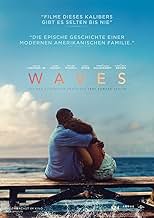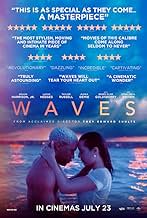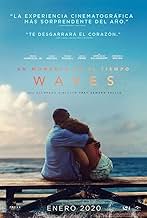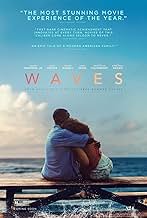अपनी भाषा में प्लॉट जोड़ेंTraces the journey of a suburban family - led by a well-intentioned but domineering father - as they navigate love, forgiveness, and coming together in the aftermath of a loss.Traces the journey of a suburban family - led by a well-intentioned but domineering father - as they navigate love, forgiveness, and coming together in the aftermath of a loss.Traces the journey of a suburban family - led by a well-intentioned but domineering father - as they navigate love, forgiveness, and coming together in the aftermath of a loss.
- पुरस्कार
- 14 जीत और कुल 40 नामांकन
Ruben E. A. Brown
- Wally
- (as Ruben E.A. Brown)
David A Payton
- Security Guard
- (as David Anthony Payton)
फ़ीचर्ड समीक्षाएं
I found the first part of the movie really captivating, intense, credible and very well acted. When the focus switches to the second teen in the families the whole plot becomes very mellow (still very well acted though but diminishing the overall impact).
Writer/director Trey Edward Shults's previous films, the unconventional Thanksgiving drama Krisha (2015) and the brilliant but poorly marketed post-apocalyptic thriller It Comes at Night (2017) would seem to have little in common with the more social realist concerns of Waves. However, all three share the same thematic DNA, focusing as they do on a family under intense pressure. And as with those films, if you're into formalism, you'll find plenty here to keep you happy; elaborate camera moves, varying aspect ratios, unusual colour correction, striking shot composition, a sound design which bleeds into the soundtrack/score (and vice versa), a quite audacious shift in focalisation at the half-way point, and a stunningly concise closing shot. On the other hand, it's emotionally bruising and takes its sweet time getting anywhere. It also asks much more of the viewer than your average Marvel movie, and some simply won't want to put in the legwork. Nothing wrong with that, of course, but if you consider cinema as entertainment only, I'd imagine Waves will leave you bored and frustrated. However, if you have the patience and are willing to take the journey on which the film wants to bring you, the cathartic rewards are many.
In a middle-class suburb in Florida, Tyler Williams (a brilliant Kelvin Harrison Jr.) is a popular high school senior and skilled wrestler, who is deeply in love with his girlfriend Alexis Lopez (Alexa Demie). At home, he has a good relationship with his sister Emily (a heartbreakingly sweet Taylor Russell) and stepmother Catherine (Renée Elise Goldsberry). However, his relationship with his domineering father Ronald (a sternly intimidating Sterling K. Brown in full-on stare mode) is somewhat strained due to Ronald, himself a former athlete who was forced to retire due to a knee injury, constantly pushing him to succeed. As the film begins, Tyler's shoulder is causing him problems, and although he keeps it a secret, he soon learns he has a Level 5 SLAP tear, with his doctor telling him he'll need surgery and a few months off from wrestling, or the damage will become permanent. However, he ignores the doctor's advice, continuing to wrestle and starting to self-medicate with Ronald's painkillers. Meanwhile, he becomes increasingly acerbic and starts drinking heavily. At around the half-way point of the film, the focalisation then shifts to the shy and socially awkward Emily, looking at her burgeoning romance with Tyler's wrestling teammate Luke (a passive and pensive Lucas Hedges). Meanwhile, the Williams family must try to come to terms with a horrific act of violence that could change all of their lives.
The most noticeable thing about Waves is the aesthetic audaciousness. What's especially interesting about the narrative bifurcation is that Emily barely appears in the first half and Tyler barely appears in the second, forcing the audience to completely recalibrate themselves vis-à-vis the film's milieu. However, for all its narrative gymnastics, it's Waves's visuals that really pop. Working with his regular cinematographer Drew Daniels, no matter how elaborate Shults's use of form becomes, it's always in service of the story, with the camera being used thematically rather than as a passive tool of observation. For example, the opening shot is inside a car occupied by Tyler and Alexis, but rather than shoot the scene in a shot/counter-shot format, Shults positions the camera between the duo, spinning in circles, and completing multiple 360-degree rotations. This immediately inculcates us into their sense of abandonment and exuberance. Before a single line of dialogue has been spoken, Shults has already started telling us who these people are. It's pure visual storytelling, showing rather telling.
This kind of form/content correlation occurs throughout the film. For example, in the first half, which is focalised by the restless and propulsive Tyler, the handheld camera rarely stops moving, reflecting his frenetic energy. However, when we shift to the quieter and more withdrawn Emily, Shults uses more static tripod shots and a much slower editing rhythm, which reflects Emily's calmer disposition. He also has the palette reflect this shift - whereas the first half is awash in garish blues, reds, and greens, the second has a more naturalistic look. A crucial part of the film's visual identity is the very unusual use of aspect ratio(s). Beginning in 1.85:1, the frame gradually reduces in width until it gets to 1.33:1, which is how Tyler's section ends. Then, at the start of Emily's section, it starts to widen again, eventually reaching 2.35:1. The narrowing ratio of the first half reflects how Tyler feels he's being progressively trapped as things continue to go wrong, whilst the widening ratio of the second half reflects Emily's determination to recover from tragedy and reconcile her family. In short, the first half symbolises an ever-increasing restriction, the second half a gradually discovered freedom.
And all of this is to say nothing of the diegetic lighting, the shot compositions and camera blocking, or the blending of Johnnie Burn's immersive sound design, Trent Reznor and Atticus Ross's discordant score, and the exceptional 32-song soundtrack.
Thematically, the film looks at the pressure to succeed, particularly in men. Ronald equates masculinity with strength, mocks Catherine's job, and barely acknowledges Emily. Instead, he pours all his effort into Tyler, through whom he's trying to live vicariously, pushing him to be the successful athlete that he himself could have been before injury ended his career. He's also acutely aware that as an African-American man, things won't come easy to his son, telling Tyler, "we are not afforded the luxury of being average." However, Ronald is by no means the villain of the piece. He seems to genuinely feel that raising Tyler in this manner is the best thing, telling him, "I don't push you because I want to, I push you because I have to". The problem with all of this is that neither Tyler nor Ronald have a backup plan, so when things start to go wrong, Tyler immediately falls apart. And as things get worse and worse, he becomes a pseudo-Job figure, with the big difference being that Job was self-aware and understood his suffering.
In terms of problems, there are a few blatantly expositionary scenes. An especially egregious example is the scene where Ronald outlines how hard it is for a black man to get ahead in the US, using that as justification for why he pushes Tyler so hard. Whilst the sentiments are fine, it doesn't ring true that this is the first time Ronald has said this to Tyler. Surely he would have given him this talk in his youth? It's a well-acted scene in isolation, but in the context of the overall script, it's too literal and seems out of place. Additionally, Shults tends to use the stuff of daytime soap to propel the plot - the end of a sports career, the prospect of having a child at such a young age, a family tragedy. The performers make the material work, but the film does come close to melodrama on occasion.
Nevertheless, although it's initially bleak, looking at loss and disintegration, Waves ultimately reveals itself to be about the ability of love to conquer despair, about how life can persist no matter the circumstances, about the importance and restorative power of family. Shults uses this framework to build a quite audacious monument that celebrates the ordinary without ever overshadowing it.
In a middle-class suburb in Florida, Tyler Williams (a brilliant Kelvin Harrison Jr.) is a popular high school senior and skilled wrestler, who is deeply in love with his girlfriend Alexis Lopez (Alexa Demie). At home, he has a good relationship with his sister Emily (a heartbreakingly sweet Taylor Russell) and stepmother Catherine (Renée Elise Goldsberry). However, his relationship with his domineering father Ronald (a sternly intimidating Sterling K. Brown in full-on stare mode) is somewhat strained due to Ronald, himself a former athlete who was forced to retire due to a knee injury, constantly pushing him to succeed. As the film begins, Tyler's shoulder is causing him problems, and although he keeps it a secret, he soon learns he has a Level 5 SLAP tear, with his doctor telling him he'll need surgery and a few months off from wrestling, or the damage will become permanent. However, he ignores the doctor's advice, continuing to wrestle and starting to self-medicate with Ronald's painkillers. Meanwhile, he becomes increasingly acerbic and starts drinking heavily. At around the half-way point of the film, the focalisation then shifts to the shy and socially awkward Emily, looking at her burgeoning romance with Tyler's wrestling teammate Luke (a passive and pensive Lucas Hedges). Meanwhile, the Williams family must try to come to terms with a horrific act of violence that could change all of their lives.
The most noticeable thing about Waves is the aesthetic audaciousness. What's especially interesting about the narrative bifurcation is that Emily barely appears in the first half and Tyler barely appears in the second, forcing the audience to completely recalibrate themselves vis-à-vis the film's milieu. However, for all its narrative gymnastics, it's Waves's visuals that really pop. Working with his regular cinematographer Drew Daniels, no matter how elaborate Shults's use of form becomes, it's always in service of the story, with the camera being used thematically rather than as a passive tool of observation. For example, the opening shot is inside a car occupied by Tyler and Alexis, but rather than shoot the scene in a shot/counter-shot format, Shults positions the camera between the duo, spinning in circles, and completing multiple 360-degree rotations. This immediately inculcates us into their sense of abandonment and exuberance. Before a single line of dialogue has been spoken, Shults has already started telling us who these people are. It's pure visual storytelling, showing rather telling.
This kind of form/content correlation occurs throughout the film. For example, in the first half, which is focalised by the restless and propulsive Tyler, the handheld camera rarely stops moving, reflecting his frenetic energy. However, when we shift to the quieter and more withdrawn Emily, Shults uses more static tripod shots and a much slower editing rhythm, which reflects Emily's calmer disposition. He also has the palette reflect this shift - whereas the first half is awash in garish blues, reds, and greens, the second has a more naturalistic look. A crucial part of the film's visual identity is the very unusual use of aspect ratio(s). Beginning in 1.85:1, the frame gradually reduces in width until it gets to 1.33:1, which is how Tyler's section ends. Then, at the start of Emily's section, it starts to widen again, eventually reaching 2.35:1. The narrowing ratio of the first half reflects how Tyler feels he's being progressively trapped as things continue to go wrong, whilst the widening ratio of the second half reflects Emily's determination to recover from tragedy and reconcile her family. In short, the first half symbolises an ever-increasing restriction, the second half a gradually discovered freedom.
And all of this is to say nothing of the diegetic lighting, the shot compositions and camera blocking, or the blending of Johnnie Burn's immersive sound design, Trent Reznor and Atticus Ross's discordant score, and the exceptional 32-song soundtrack.
Thematically, the film looks at the pressure to succeed, particularly in men. Ronald equates masculinity with strength, mocks Catherine's job, and barely acknowledges Emily. Instead, he pours all his effort into Tyler, through whom he's trying to live vicariously, pushing him to be the successful athlete that he himself could have been before injury ended his career. He's also acutely aware that as an African-American man, things won't come easy to his son, telling Tyler, "we are not afforded the luxury of being average." However, Ronald is by no means the villain of the piece. He seems to genuinely feel that raising Tyler in this manner is the best thing, telling him, "I don't push you because I want to, I push you because I have to". The problem with all of this is that neither Tyler nor Ronald have a backup plan, so when things start to go wrong, Tyler immediately falls apart. And as things get worse and worse, he becomes a pseudo-Job figure, with the big difference being that Job was self-aware and understood his suffering.
In terms of problems, there are a few blatantly expositionary scenes. An especially egregious example is the scene where Ronald outlines how hard it is for a black man to get ahead in the US, using that as justification for why he pushes Tyler so hard. Whilst the sentiments are fine, it doesn't ring true that this is the first time Ronald has said this to Tyler. Surely he would have given him this talk in his youth? It's a well-acted scene in isolation, but in the context of the overall script, it's too literal and seems out of place. Additionally, Shults tends to use the stuff of daytime soap to propel the plot - the end of a sports career, the prospect of having a child at such a young age, a family tragedy. The performers make the material work, but the film does come close to melodrama on occasion.
Nevertheless, although it's initially bleak, looking at loss and disintegration, Waves ultimately reveals itself to be about the ability of love to conquer despair, about how life can persist no matter the circumstances, about the importance and restorative power of family. Shults uses this framework to build a quite audacious monument that celebrates the ordinary without ever overshadowing it.
After my wife and I walked out of the movie theater, completely devastated (in the best possible ways) by what we had seen, there was a group of teenagers (the perfect audience for this film) buying tickets and I couldn't help but think about how lucky they were to be seeing Waves. It's the type of film that if one sees it in their youth, it could change how you view movies, art...life.
I will say nothing more about Waves except it is an absolute must-see, and if it finds its audience, it has the chance to be a generational touchstone film.
I will say nothing more about Waves except it is an absolute must-see, and if it finds its audience, it has the chance to be a generational touchstone film.
I love a good story, and to be honest this film has quite a simple, albeit interesting and emotional story. But this film isn't about just a simple sad story, it's about the emotional connection between the characters. The cinematography is astounding.. great colour, close ups and longish periods of seeing an extended reaction. Might sound completely dire, but actually the actors were up to the challenge and create unique and engaging characters who you genuinely feel for. And isn't a simple good/bad film or people. You can see flaws and loveable traits in them all. The way the director characterises adolescent love is intense, genuine and beautiful. It really is a work of art, not because it's strange (it isn't) but because it manages to capture emotions in such a realistic way that delve into your own heart, in a way that you couldn't even do yourself. I have not seen a film that was able to do what this film did. Despite not having a particularly engaging story, I was indulging in every second of this film, mesmorised.
So why just an 8? I'm not really sure. It deserves a 9, but part of me thinks there should be a more complex story behind it, even though it's not really necessary. In some ways it reminded me of Moonlight, but the atmosphere and subject very different.
I recommend to anyone that is able to cry at a movie (male or female), but the Marvel superhero film lovers and children/adolescents probably won't engage with it. The rest of you.. go watch it.
So why just an 8? I'm not really sure. It deserves a 9, but part of me thinks there should be a more complex story behind it, even though it's not really necessary. In some ways it reminded me of Moonlight, but the atmosphere and subject very different.
I recommend to anyone that is able to cry at a movie (male or female), but the Marvel superhero film lovers and children/adolescents probably won't engage with it. The rest of you.. go watch it.
This treasure of a film explores the emotions, circumstance and consequence after a moment of chaos, that moment when in an instant the world begins to crumble and the lives and directions of so many are instantly and irredeemably altered. An original story, beautifully shot, elegantly performed and imaginatively directed. Left me asking the question: are any of us as bad as our worst fifteen minutes?
क्या आपको पता है
- ट्रिवियाThe script Trey Edward Shults sent to Sterling K. Brown was a PDF with embedded music cues, varying font sizes and colors, and notes about aspect ratio changes.
- गूफ़When Ronald is with his daughter Emily by the lake fishing, there is a sound of a plane overhead and Emily looks up at the sky through a gap in the tree canopy's and there's a plane in the sky, the problem is it is moving too slowly in relation to its size suggesting it is closer to the ground and therefore should be seen to be moving a little quicker. They obviously used CGI but should have got a better handle on this perspective .
- कनेक्शनFeatured in CTV News at 11:30 Toronto: 10 सितम्बर 2019 को प्रसारित एपिसोड (2019)
- साउंडट्रैकFloriDada
Written by Panda Bear (as Noah Lennox), Avey Tare (as David Portner), Geologist (as Brian Weitz)
Performed by Animal Collective
Published by Domino Publishing Company USA (ASCAP)
Courtesy of Domino Recording Company
टॉप पसंद
रेटिंग देने के लिए साइन-इन करें और वैयक्तिकृत सुझावों के लिए वॉचलिस्ट करें
विवरण
बॉक्स ऑफ़िस
- बजट
- $60,00,000(अनुमानित)
- US और कनाडा में सकल
- $16,58,790
- US और कनाडा में पहले सप्ताह में कुल कमाई
- $1,34,333
- 17 नव॰ 2019
- दुनिया भर में सकल
- $25,76,990
- चलने की अवधि2 घंटे 15 मिनट
- रंग
- ध्वनि मिश्रण
- पक्ष अनुपात
- 1.33 : 1
- 1.85 : 1
- 2.66 : 1
इस पेज में योगदान दें
किसी बदलाव का सुझाव दें या अनुपलब्ध कॉन्टेंट जोड़ें











































